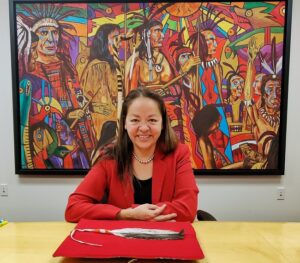Ontario’s appeal of Justice Hennessy’s finding for the Anishinabek

By Catherine Murton Stoehr
The trouble with summarizing events in Ontario’s recent appeal of Justice Hennessy’s finding in favour of the Anishinabek is that doing so inadvertently lends an air of respectability and inevitability to proceedings that were neither.
“As a people, this colonial court process is not our preferred resolution to a disagreement,” said Batchewana First Nation Chief Dean Sayers. “Stop wasting money and get to the bargaining table… It is time for Ontario to honour the augmentation clause to ensure that the wealth generated from the lands and resources will also benefit First Nations.”
The Robinson Huron Treaty Litigation has been divided into stages. Stage 1 to decide if money is owing; the court determined that it was. Stage 2 to consider legal objections Ontario and Canada raised to the proceedings; the court rejected those objections. A third trial will determine what counts as “profits from the territory” in the past, what the Anishinabek’s cut should be, and how to calculate both going forward.
Ignoring the Robinson Huron and Superior communities’ request to return to the negotiation table, and striking a more aggressive posture than Canada, Ontario has appealed the verdicts for both Stage 1 and Stage 2, setting in motion at minimum two trials to review Justice Hennessy’s decisions in favour of the Anishinabek. Should either side disagree with the appeal court’s response, they can appeal again to the Supreme Court of Canada. In a worst-case scenario, the litigation could expand into nine separate trials.
Because the appeal was launched, the Robinson Huron and Superior litigation teams had to respond to what Ontario characterized as flaws in Justice Hennessy’s reasoning to defend their initial victory.
Ontario objected to Justice Hennessy’s finding that the treaty placed a “mandatory and reviewable” obligation to increase the annuity when economic circumstances permit, on Ontario or Canada. Ontario claimed that while they have the option to increase the annuity above $4 at any time at their own discretion, they are under no legal obligation to do so, further asserting it was their prerogative, not the courts’, to determine the size of the increase, saying, “Judges ought not to see themselves as finance ministers.”
In her ruling, Justice Hennessy laid out a path for courts to determine how much the annuity should be increased and to compel the Crown to pay monies owing. Ontario proposed that only the Crown has the jurisdiction to review and increase the annuity and only when and if they wish, while the court’s role should be limited to hearing the case if the Anishinabek then claimed that the increase was too small.
Justice Brown of the Appeal Court, observing that there has been no augmentation since 1875, asked if the Crown never exercises its discretion to raise the annuity how can the court review the decision?
Justice Strathy noted that Ontario’s proposal “sounds like a remedy without any teeth.” The Crown has been in a position where increases above $4 could be made and all the court can do is tell the Crown they should “get at it?”

In her remarks, Robinson Huron counsel Dianne Corbiere noted that both parties to the 1850 treaty understood their relationship in terms of the Covenant Chain, a relationship between the Anishinabek and the British in which parties would have met regularly for ongoing negotiations on matters of mutual concern. Far from affording the Crown sole discretion over augmentation of the annuity, neither party would have conceived of Ontario acting unilaterally in any matter that affected the Anishinabek, certainly not one as significant determining the value of proceeds of the territory.
One of the defining characteristics of treaty trials in Canada is the bizarre moral inversions sometimes offered to justify not keeping treaties. Ontario’s appeal offered a classic.
The treaty notes that the annuity will not rise above $4 per person but qualifies that statement with the clause, “or such further sum as Her Majesty may be graciously pleased to order.”
Ontario argued that speaking for the British, William Benjamin Robinson intended for the Anishinabek to understand that the graciousness of the Queen could potentially amount to zero dollars ever. Which put the Robinson Huron counsel in the odd position of having to defend the graciousness of the Queen, or at least assert that the Anishinabek of 1850s thought she had some.
Justice Brown noted that the $4 sum was in part based on Robinson’s negotiating position that the territory in question was a “barren wasteland” (note: no one on either side then or now thought that but Robinson was trying to get the price down). Justice Brown asked Ontario’s counsel, “Is it your position that the graciousness of the Queen doesn’t require the Queen to augment the annuity to the [then going rate of] $10 per person notwithstanding discovery of a heck of a lot of richness under the surface?”
Folks with an interest in the outcome of an appeal can submit statements of support for either party. The Blood Tribe from out west submitted a statement speaking to an issue to be determined by the appeal court that could adversely affect their own treaty negotiation, and four other parties, Biigtigong Nishnaabeg, the Assembly of First Nations, the Indigenous Bar Association, and the Union of British Columbia Indian Chiefs submitted statements supporting the Anishinabek and Justice Hennessy’s initial verdict in their favour.
At the end of the day, the best possible outcome of this appeal would be for the Justices to uphold Justice Hennessy’s original verdict, a finding that could even then be appealed to the Supreme Court.
If Anishinabek community members watching this arduous, often overtly racist, process plod interminably on are frustrated with the wait and horrified by the expense, they could hardly be blamed. If the legal team tires at this point in the marathon, forced to martial their forces once again to fight an appeal in which the only possible victory is not losing the ground they already won, who would be surprised?
Who would have thought the ability to endure absurdity would be the key to this great struggle of our time?


